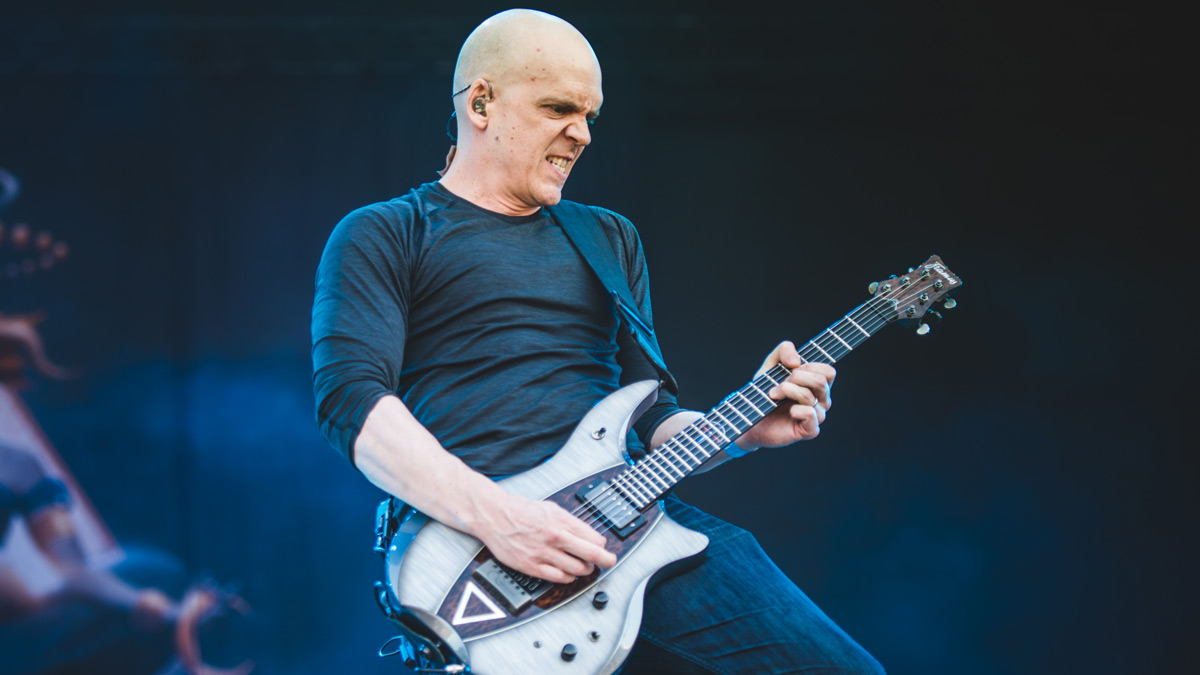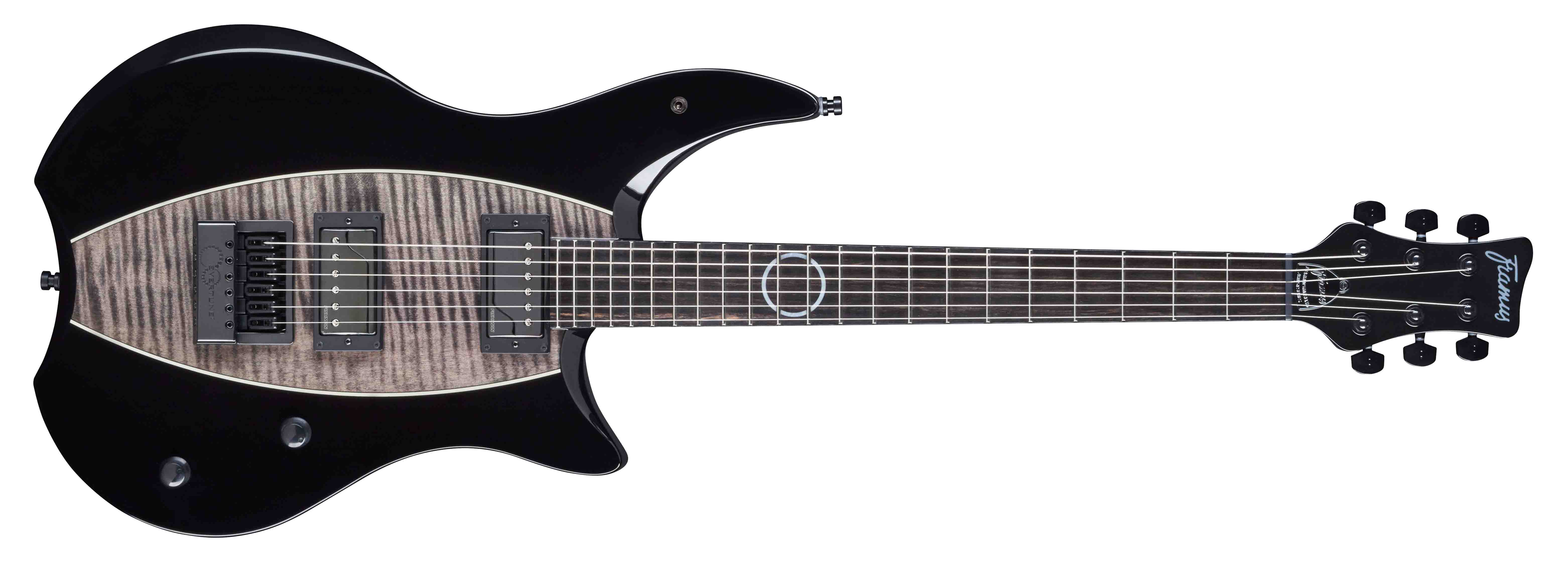Devin Townsend: “I toured for 11 months last year, and the band... I don't know if we broke even”
The prog savant on disassembling the Devin Townsend Project, his grand future plans and guitar amp polygamy

Want all the hottest music and gear news, reviews, deals, features and more, direct to your inbox? Sign up here.
You are now subscribed
Your newsletter sign-up was successful
Devin Townsend is one of the most idiosyncratic artists in modern metal.
Aside from his notorious tenure in extreme metallers Strapping Young Lad, he's known for a string of solo albums that, starting with the now-classic Ocean Machine in 1997, blended atmospheric new age with progressive metal.
On the eve of the release of a live DVD, Ocean Machine - Live At The Ancient Roman Theatre Plovdiv, where the Devin Townsend Project played both a greatest hits set accompanied by an orchestra and Ocean Machine in its entirety, Townsend is in a reflective mood.
We caught up with Dev for a candid conversation on what's next, but first, we had some technical issues to deal with...
MR: Sorry about that, just checking the recorder was working.
"I've had that happen to me. Even more troubling on my front, I lost half an album at one point. The album Physicist, I erased all the work that I had done halfway through. I think that's probably why that contributed to that album being sort of sub-par for me, just because by the time I had to go back and do it, I was just over it."
That makes sense. A lot of artists are ready to do the next thing by the time they've finished an album, it seems.
Want all the hottest music and gear news, reviews, deals, features and more, direct to your inbox? Sign up here.
I like novelty when I'm writing and recording, and you know, those sort of improvisational, 'aha' moments are very often the things that make the record interesting
"Plus, a lot of how my creative process functions is, I like novelty when I'm writing and recording, and you know, those sort of improvisational, 'aha' moments are very often the things that make the record interesting. If you have to try and recreate that, it just doesn't work."
Multi-tracking takes is so easy these days that it means you can try again, surely?
"I just keep going until I hit something, and I don't keep the takes... I'm not a big fan of options, to be honest. The more options that I have, the less time that I spend actually completing things... ultimately, I think if you have endless choices, I mean, the tendency to just choose endlessly is there and that doesn't do anything for anybody, really."
Sometimes constraints can be helpful as a creative, right?
"If someone says, 'Look, you can't go outside of these lines, but within those you can do whatever you want,' I mean, I find that typically really inspiring. I mean, that's even why things like marriage work for me.
"It's true, it's like, some people tend to think that, as a species, human beings are by nature polygamous, and to not explore that limits your experience on this plane, but at the same time, it's like, there are so many things that I want to do that if I can get certain things locked down, I'm like 'Okay, so there's your parameters there, go.' It's a lot more enjoyable for me."
That acceptance of restrictions also sounds like you've grown more comfortable in your creative self. Is that fair?
"The idea of progressing, for me, as a person, as an entity, as an artist, often means that you're going to contradict yourself. I think what's interesting, as I careen into middle-age here, is that a real tendency - and I think biologically as well - there's a tendency to fight it.

"As an artist, as a person, as just a human in general, I think there are great things that come from each of these periods [of your life], and although you're not as fresh-faced as you were when you were 22, the things that I gain... in terms of the perspective on goals versus objectives, those things result in really cool artistic things that you wouldn't be able to achieve at any other point in your life.
"This Empath project, and the fact that I disbanded the DTP and everything, these are things that, as difficult as they can be, I revel in, because it's not going to happen again. You know, this whole transitional age, between youth and old age, that I'm in, I mean, shit dude, it's got a lot of really cool things, right?
As you were saying that, the thing that springs to mind is the track Amends from the last Vennart album - I'm not sure he could have written that song at any other point in his career.
"You know, I think ultimately, when you're participating with an artist, and if you're participating in them for reasons other than, 'they're the hit thing to be into at the moment'... I think the whole thing you're invested in is their connection to artistry, and that changes and morphs."
Right.
Every time you have something that has some sort of success, it's crazy as an artist to constantly be tempted with repeating yourself, for the sake of hoping to y'know, get a little bit of extra money
"That's why it's important as an artist to really keep yourself in check as to what your motivations are. For me, I make money, like I don't make huge amounts of money, but I make [enough] money, thankfully, that I can support my family and continue to do what I do without having to compromise, necessarily.
"But I'll tell ya, man, every time you have something that has some sort of success - the last record did well for me - or I made a song that got on to a soundtrack people liked, and you make a bit more money off of that, man, it's like, crazy as an artist to constantly be tempted with repeating yourself, for the sake of hoping to y'know, get a little bit of extra money.
"It's like, your wife is happy that you can get a new dishwasher, or whatever, you know, the tendency is to even subconsciously convince yourself that, 'Oh, that's what I should be doing; I should be making another record like that,' when, as an artist in the truest sense of the word, your only obligation is to continuously call yourself out on your own bullshit, and hope that where you end up next is exactly where you should be, however that manifests itself monetarily or commercially.
"Sometimes it's hard to be like... 'I can't do what I know people want,' because it's not in line with where I've gone, but that's just kind of a part of it."
And this is things like disbanding DTP?
"That's one example of it, but it's as good an example as any because the mechanism is the same. With DTP, for example, it's a hard thing to answer concisely, but, in order to pay for lots of people's salaries in the climate musically in this industry that we're in now, the only alternative was to relentlessly produce product, relentlessly tour. All these things.
"I mean, all that is great, because it builds the brand, but it becomes a vacuum in a sense that you have no real time to process what's going on. What I've found with my own creative process is that it needs to have a constant sort of self-analysis just very practically to be inspired. Otherwise you just get really bored.
When I sat back and looked at my life and my family and my mental health and my physical health and my objectives as an artist, I had to make some really hard decisions with that DTP situation that affected a lot of people
"We toured for so long and with such relentless scheduling, that by the end of it all I was writing about was that. Things at home were falling apart on some level, like even physically, the house needs tons of work and I'm not there to do it... and the whole thing that is required for me to get to the next stage artistically really is more involved with me just being able to grow with life, as opposed to keeping it all at bay.
"By touring the way that I had done, all it was doing was keeping the rest of my world at bay, in the hopes that that touring world would transpire into, like, a lot of income or whatever. Ultimately, man, I toured for 11 months, 10-and-a-half months last year, and the band... I don't know if we broke even. There are certain residuals which come from the exposure, but ultimately, I was working to fund the work, and I didn't need to.
"When I sat back and looked at my life and my family and my mental health and my physical health and my objectives as an artist, I had to make some really hard decisions with that DTP situation that affected a lot of people, y'know? Ultimately, that is the most practical example of having to follow your creative motivations wherever they may lead, even if it means making things that are viewed as a selfish decision, or even if it means the next thing that I do confuses people who have some sort of investment in what I've done over the last little while. That's how it goes."
In the documentary on the DVD, there's a section where you talk about the number of shows you'd played - it sounds like the sort of touring schedule you'd expect of a band in the '70s.
"Yeah, I think the thing I realised with that was again I had to sit back and say, 'What are you trying to achieve here?' Do you want to be a rockstar? Do you want to make a bunch of money? What are your objectives?
"My objectives are no different now from what they were in the beginning: I want to have a good life... and I want to be artistically free to explore each phase of my life as it presents itself."
So, picking up on that - what are you currently working on?
"Oh, I don't know. Devin at age 46? [laughs] I think just for brevity, we're gonna call it Empath... I'm currently still writing it, but I start recording it [soon]. I've got some brilliant people involved in it, like Morgan Ågren and Mike Keneally, and all these great players, personalities and minds.
[The new album] runs the gamut between brutal, death-metal style insanity and really, really chill adult new age, and really proggy stuff, and really orchestral stuff, and really commercial stuff
"In the past what I've done is I've compartmentalised emotions and very consciously said 'Okay, this album is about this energy'... and it was easy for me, in that sense. Empath seems to be coming together that it's a lot of things in one place. So it runs the gamut between brutal, death-metal style insanity and really, really chill adult new age sort of things, and really proggy stuff, and really orchestral stuff, and really commercial stuff, but all kind of like, in the same place.
"Even the title Empath, I think the implication of that is that I'm trying to participate in emotions in a more direct way as a person, and I think that's clearly reflected in the music."
In terms of gear, are you now fully Axe-Fx based going forward? Do you use any real amps?
"I was fully Axe-Fx two months ago. Now I'm using amps and Axe-Fx again. I mean, the only constant is the change, for me. Yeah, the Axe-Fx, I use it all the time, for everything, but the new stuff I've written really really benefits from amps, and there are two amps I'm using right now that I absolutely love.
"The first is the Mesa Triple Crown 100. I just love that amp - it's so good. I use that with an Axe-Fx and a pedalboard - Daniel over at TheGigRig has made me some awesome stuff, and I've been constantly working with him - but I've really pared down the system.
"Then, in the studio I'm actually using this Orange Custom Shop 50 for a real sort of, mid-gain, sort of low-gain sound... I run both those [heads] into the [Two Notes] Torpedo Studio. I use the Axe-Fx with them, and the combination of all that stuff is just, oh my God, it's just so fuckin' fun, man. I just love it."
On the Torpedo, are you using stock IRs or do you have your own?
To be able to get that sort of, chewiness from an amplifier, and that real zero-latency kind of vibe, is great for me
"I'm working with this company called Valhalla. Valhalla IRs, it's the same guy that worked with SE microphones, who I'm also working with for my vocal mics, and they've started an IR company called Valhalla and they've been making me a bunch of custom IRs.
"So I have an Orange one for the Orange, and a Mesa one for the Mesa. You know, I've been using Kemper and Axe-Fx for so long, and I mean, I love that stuff, and the Axe-Fx in particular is just a quantum leap for guitar players, but I find that every record, what I'm going for is a little different. To be able to get that sort of, chewiness from an amplifier, and that real zero-latency kind of vibe, is great for me.
"At the same time, it's different things for different things - like, you know, I've been working with Waves and their Paul Reed Smith Archon plugin, and it's just such a great mid-gain tone as well, so as much as I may be monogamous in my personal life and my relationships, I'm happily polygamous when it comes to amplifiers, digital or otherwise."

What else are you leaning on heavily at the moment, then?
"Framus guitars I use exclusively. I've got two models that I've built with them. The main one's called a Stormbender - it's basically a mahogany body, thick maple top, ebony fretboard, Fishman Transcendence Fluence pickups, which are the signature pickups I'm working with.
"For delay units, I work with Mooer and we've got the Ocean Machine pedal that I built with them, and we're working on a couple of other products.
"As much as I work with a lot of different companies, my objectives are always really constant, so I'm looking for the same thing - I mean, my relationship with Mesa is long-standing, but I flip between analogue and digital as things require, but I mean, I always come home to them, man. Their new Triple Crown 100 is absolutely stunning, and I think again, for a very different thing, and it works for me, the Orange stuff, I just love it man; it's such an idiosyncratic sound.
"The Triple Crown is y'know, MIDI and the Cab Clone, and multi-soak, and it's just such a functional touring amplifier, but the Orange stuff is so much fun because it's single-channel, there's no reverb, there's no effects loop, and it's just such a rich, cool sound. Between those two amplifiers and the Axe-Fx right now, it's like there's nothing I can't do. I'm unstoppable!"
Previously with Mesa you were using Rectifiers, right?
"Yeah, and I mean, not that I fell out of love with it, but I was always kind of somewhere between the vintage and the modern, and the modern was too much and the vintage wasn't enough. So I put in different tubes, I tried it with EL34s, and then I tried to get the Tube Screamer in front of it as a clean boost, but then I was having to use the amp gizmo for MIDI switching if I wanted to do it, plus there was sort of like, a gap when it came to like, the switching over of the channels, y'know?
"I was really attracted to the 5153, but then again, the 5153 didn't have that sort of meat in the low-mids that I really dug from the Mesa stuff, so when they released [the Triple Crown] and sent it to me, I was like 'Okay, you've ticked all the boxes, this is killer, I love it.' Working in combination with Axe-Fx with that, it's just a phenomenal tool."
That does sound pretty good.
"But I mean, it's going to change again, man - it's like, I think again, unless you're contradicting yourself as you grow, you're not growing!"
Ocean Machine - Live At The Ancient Roman Theatre Plovdiv is out on 6 July via Inside Out Music.
Alex Lynham is a gear obsessive who's been collecting and building modern and vintage equipment since he got his first Saturday job. Besides reviewing countless pedals for Total Guitar, he's written guides on how to build your first pedal, how to build a tube amp from a kit, and briefly went viral when he released a glitch delay pedal, the Atom Smasher.
